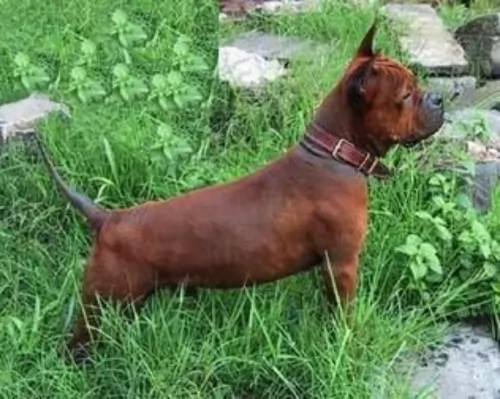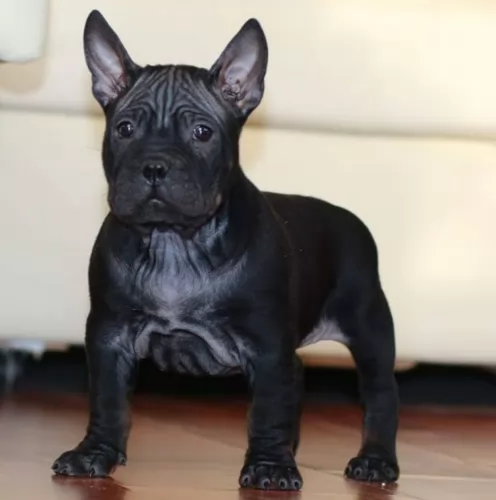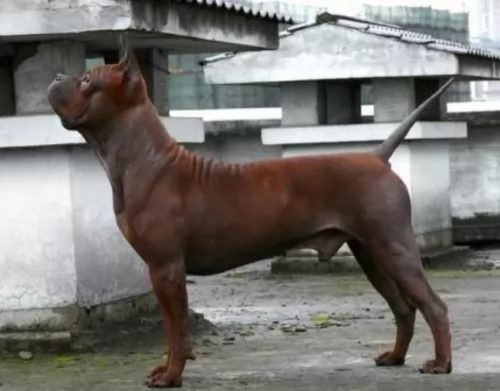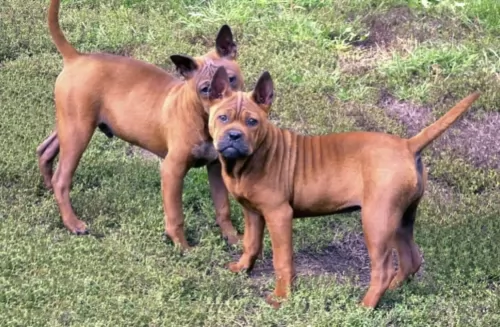 Petzlover
PetzloverChinese Chongqing Dog is originated from China but Kuri is originated from French Polynesia. Both Chinese Chongqing Dog and Kuri are having almost same height. Chinese Chongqing Dog may weigh 9 kg / 20 pounds more than Kuri. Both Chinese Chongqing Dog and Kuri has almost same life span. Both Chinese Chongqing Dog and Kuri has almost same litter size. Both Chinese Chongqing Dog and Kuri requires Low Maintenance.
 The Chinese Chongquing Dog is a very rare and unusual breed found only in China and now in Canada. The Chongquing is native to the city of Chongquing, China. This is an ancient breed that is believed to have lived in China over 2000 years ago during the Han Dynasty. It was a hunter and protector and still functions in those roles today., although there are very few left in China. Following the revolution and creation of the People’s Republic of China, the CQ Dog was only found in the rural areas of the country.
The Chinese Chongquing Dog is a very rare and unusual breed found only in China and now in Canada. The Chongquing is native to the city of Chongquing, China. This is an ancient breed that is believed to have lived in China over 2000 years ago during the Han Dynasty. It was a hunter and protector and still functions in those roles today., although there are very few left in China. Following the revolution and creation of the People’s Republic of China, the CQ Dog was only found in the rural areas of the country.
Pottery versions of the Chongquing Dog and burial figurines have been found in excavation sites from tombs of the Han Dynasty. In this isolated and mountainous area of eastern China, the dogs were unknown throughout the rest of China. Because of this the breed is relatively untouched by human intervention and is today about the same as it was 2000 years ago. There has been no interbreeding to change the natural evolution of the breed. They have their own unique personalities and temperaments.
At this time, it is believed that the Chongquing Dog is more endangered and rarer than the panda. Current breeding is diluting the breed as there are so few true bloods cross breeding and inbreeding is occurring. The knowledge of the exact breeds that contributed to the original Chongquing Dog was lost ages ago. The CQ Dog is known for loyalty, noble character, bravery and protecting its own. Today there is one kennel breeding these dogs outside China in Canada.
Kurī, also known as Guri or Peroor New Zealand Native Dog, is the Maori name for this dog which was introduced to New Zealand by the Maoris when they migrated from East Polynesia around 1280 AD.
They were in fact Polynesian dogs which died out in New Zealand. The Māoris would use the dog as a food source and the skins would be used to make some form of clothing. The bones were used to make items such as necklaces and fish hooks.
Not surprising then that the dog became extinct in New Zealand, with the last known Kuri specimens being found in the Museum of New Zealand Te Papa Tongarewa.
 This breed is not well known, even in China. However, its likeness has been found in pottery dating back to the Han Dynasty. It is now beginning to be show in select dog shows. The general appearance upon which a current standard is being developed includes:
This breed is not well known, even in China. However, its likeness has been found in pottery dating back to the Han Dynasty. It is now beginning to be show in select dog shows. The general appearance upon which a current standard is being developed includes:
The Chongquing is a medium sized, compact and square dog that is powerful, muscular and strong. He is unique in appearance, tail and coat. His head is large, broad and flat. There are wrinkles from the muzzle to the forehead between his eyes. His eyes are brown, and the rims are black. He has high set, small ears that are triangle shape. Its frame is sturdy and strong. He is very muscular, and his strength and speed are explosive.
The Chongqing Dog can be one of three sizes: small, medium and large. All are hunters, but each hunted different prey. The appearance of all three sizes are proportionally the same.
The Kuri is extinct now but it was a small to medium sized dog with a thick set neck. He stood between 25 and 46cm and weighed about 13 to 15 kilograms.
He had thick medium-length rough textured hair, small head, erect ears, short legs and a bushy tail. The color of their weatherproof coats varied and some were black, some white or cream and some were a mix of colors and patterns.
An interesting feature about them is that they didn’t bark but instead they howled. They were good at hunting birds.
The Kuri wasn’t considered the brightest breed, but he would have benefited from some training and socialization as this just makes a dog a better pet in every sense – more obedient and better behaved in all situations.
Some Kuris were friendly and able to bond with their human owners, while others were independent and somewhat aloof. Their size would have allowed them to be kept in the city or the country as they weren’t particularly energetic dogs, not requiring much ground to run around in.
 The Chongqing Dog is a confident, passionate, fearless and loyal dog. He is brave, alert, thoughtful and elegant. They make good companions for their people, but they are very wary of strangers and are ready to attack in order to protect their people. They are affectionate and loving with their people, including older children. They should never be off-leash in the company of other dogs.
The Chongqing Dog is a confident, passionate, fearless and loyal dog. He is brave, alert, thoughtful and elegant. They make good companions for their people, but they are very wary of strangers and are ready to attack in order to protect their people. They are affectionate and loving with their people, including older children. They should never be off-leash in the company of other dogs.
It appears as though some Kuris were kept as pets and that they were able to develop loving relationships with their owners.
We don’t know too much about the extinct Kuri, but scientists are now studying and analyzing the hairs of the dog to find out more about it, and specifically why the Maori dog disappeared some time in the 19th century without a trace.
They will also be analyzing Kuri bones salvaged by archaeologists and which were found on rubbish heaps. These bones can be tested to see whether the diet of the Kuri changed much between the days of Maori settlements and the arrival of the European settlers.
Some Kuri dogs scavenged while others were pets and ate well. The lifestyle they led would have determined their health. In those days they would have suffered with dental disease, common in adult dogs. Left untreated, dental disease can lead to dental tartar buildup with gum inflammation and tooth loss.
Dental disease can also lead to other organ diseases. These days brushing your dog’s teeth with canine toothpaste and toothbrush can help to ward off dental disease.
Those Kuris that weren’t pets, tried to survive scavenging, and their homeless situation could well have led to ear infections – caused from a wax- and dirt buildup within the ear. He would have been frantic trying to scratch his ears. In modern times, if your dog showed signs of an ear infection, you would need to get him to the vet.
 The best food for this dog is made yourself of human grade foods. Either raw or cooked yourself . This will keep their skin, teeth and coat healthy.
The best food for this dog is made yourself of human grade foods. Either raw or cooked yourself . This will keep their skin, teeth and coat healthy.
This is a really healthy breed especially due to the isolation and natural selection of their history.
He needs about 30 minutes of exercise today. He has no history of participation in canine games.
The Kuri will have required regular grooming which means a brushing down twice a week. Brushing would have been useful to prevent loose hairs from shedding with the dog. He would have had to have his ears and eyes checked too to avoid infections. Brushing him would have given his owner the chance to check him over for fleas and ticks too.
As the Kuri wasn’t an overly energetic dog, a walk a day would have kept him content and fit.
The Kuri was a dog that essentially formed part of someone else’s diet. Those that managed to escape being a meal for someone no doubt had to scavenge for food. Because they were used to help people catch birds, they themselves were used to catching birds for themselves.
As a small to medium sized dog, if you were to keep such a dog as a pet you would have given him a cup or two of dried kibble a day and tried to vary his diet by including some home-cooked food and raw meat.